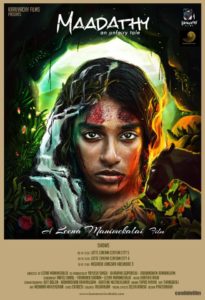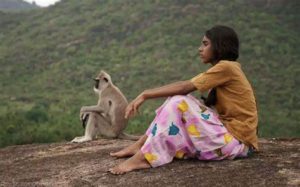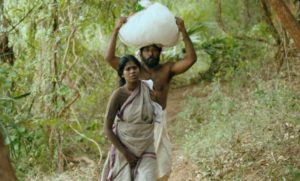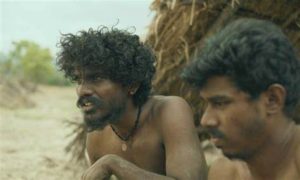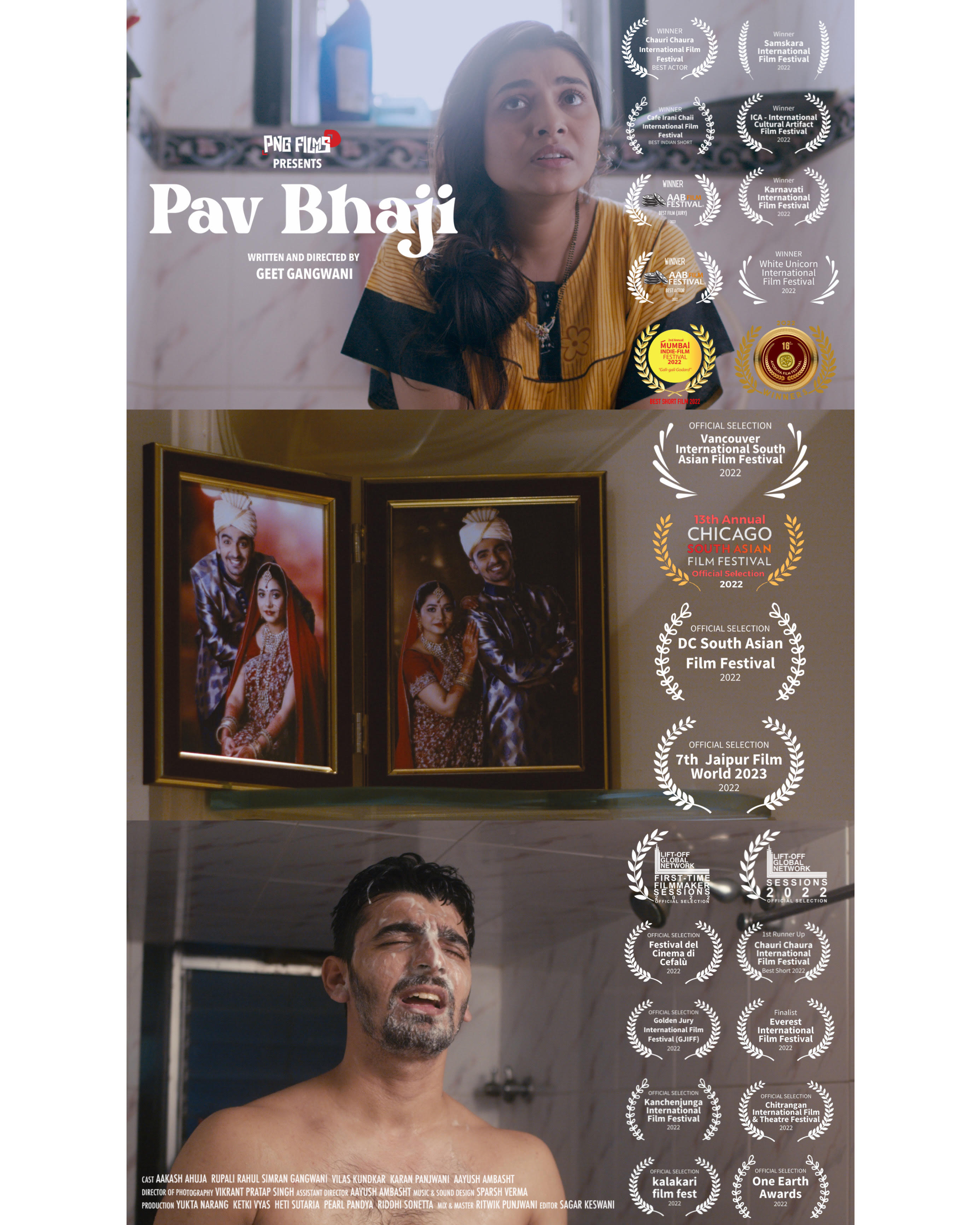
IVWFF 2020 Film Review “Maadathy: An Unfairy Tale”
WATCH THE TRAILER HERE
First, the Recap:
What lessons are learned from inequity? The wrongs we see perpetrated in this world, whether evil acts of the one or premediated machinations of the many, demand without dispute that justice would be meted out swiftly and with all intent to ensure absolute restitution would be gained. However, when it is a loss of purity, a light extinguished too soon, how much more is the inner fire burning to see requital become the course most pursued and fervently desired? A young girl named Yosana (Ajmina Kassim) is a part of the highly shunned Puthirai vannaar caste in her and her family’s village. Trying to find escape in the forest surrounding her brush-based home shared with her mother Veni (Semmalar Annam) and father Sudalai (Arul Kumar), Yosana tries to navigate the tenuous search for her own purpose, connection with the world around her, and even love, unaware of the potentially harsh realities that might await her should she venture too far.
Next, my Mind:
In the annals of Indian lore and inherent, well-established tradition, there resides the existence of “little or folk deities” known as the siru theivam, lesser gods born out of overt violation against those who were grievously wronged in the name of their society. It is with this as a foundational backdrop that we are entreated to a decisively eerie narrative that puts a frightening, ominous, and fully uncompromising spotlight on the destructive potency of anger, misunderstanding, misplaced judgement, merciless cruelty, and blatant hate, but also the tempest of retribution injustice fosters. Wrapped in a shell that is part fable, part actuality and all-encompassing in its gut-wrenching, palpably impactful execution, this 90-minute feature effort from writer/director/producer Leena Manimekalai, co-writers Rafiq Ismail and Yavanika Sriram, and co-producers Bhavana Goparaju, Abinandhan Ramanujam, Abhayanand Singh, and Piiyush Singh strikes a profoundly disturbing, excellently rendered, and emotionally draining chord throughout.
Another of the feature film efforts presented as part of the 2020 I View World Film Festival sponsored by the embassies of India, Canada, Sweden, Netherlands, Italy, Argentina, British Council, and The EU, curated by Engendered Delhi, and in partnership with NYCSAFF, the intermixing of the fantastical with the tangibly, provocatively relevant works like a dream here in order to emphasize all the thematic veins the narrative chooses to make known, embodying a young girl’s chaste innocence, natural curiosity, and sweet intentioned heart colliding with ever-present examples of the abject rage of caste oppression, general mistreatment, political corruption, and the specters of imperious patriarchy and religious overzealousness that subsequently initiate such massive abuse of power and an utterly false piety that gets directed and inflicted upon the vulnerable.
It is these grander explorations that the viewer stands witness to as it all falls with unrelenting ferocity, whether verbally or physically, upon one Puthirai vannaar family solely due to them having been born into a “lesser” caste whose only purpose is to serve their “masters” and never look upon them, for to do so would “pollute” the professed ruling elitists. The film deftly and with all force conveys the heart-rending implications hypocrisy and blame birthed in ignorance brings, as by the time the film’s act arrives with a resoundingly brutal jolt, it then paves the way for an equally shaking finale and literal final visual whose echoes will remain burned into your mind well after the credits are over. I think it’s the portrait of veritable, authentic virtue being slowly then forcibly dismantled that resonates so deeply, and it really does call to mind the fact that there is so much in this world that needs to transform unreservedly to see human beings come to their sense and realize that we are ALL deserve equal treatment, regardless of class or culture.
From a visual standpoint, the film is shot brilliantly in order to make most effective utilization of the lush forests that make up the majority of the story’s backdrop, but that becomes a character in itself, as it represents both emancipation and alluring joy on multiple levels but also bitter imprisonment and personal desolation. This is also put to affecting use for the aforementioned final image that places the heartbreakingly defiant exclamation point on everything viewed. There is also a cleverly conceived use of cloth-based paintings that feeds the story and even adds to the more imaginatively creative conceptual elements the story engenders. Karthik Raja‘s atmospheric and stirring musical orchestrations arrive with wonderfully apropos effect here as well. It’s all a sobering illustration of the human condition suffering from hugely misguided notions and how the film so unnervingly but with piercing intent chooses to paint this very much carries the weight it should and ideally raises the awareness it NEEDS to.
Kassim is nothing short of amazing, both poignantly endearing and then dynamically tragic, in her performance as Yosana, a perfect characterization of youthful beauty and untainted wonder who makes every effort to find the means to innocuously “rebel” against her family’s overly but forcibly sheltered Puthirai vannaar reality in order to try and discover the awe of life around her. Wishing to encounter love as well, the journey she embarks upon is so beautiful in its simplicity, soul, and touching naiveté that it soon belies the possible dangers she’s so blissfully unaware of that might befall her should her ventures and innate desire to confront who she wants to be end up leading down darker paths or even to something unexpectedly divine. The raw believability and realism that Kassim infuses into Yosana’s persona becomes such a key factor in the character’s story, and she enacts it with emotive grace and inner intensity that shines through with magnificent maturity.
Annam brings about a fantastically carried out performance in her role as Veni, Yosana’s hard-working mother whose only ultimate concern is for her young daughter’s well-being and ideally better future. The road Veni ends up on has an unexpected tangent and it places an even deeper degree of plausibility to how she sees Yosana’s future if things don’t adjust. Kumar arrives as Yosana’s father Sudalai whom at times doesn’t always seem the most attentive or appreciated man, but still toils as he’s able to provide for their oppressed family. Patrick Raj excels as Panneer, a young village boy/man with whom Yosana becomes infatuated with, though its final outcome may or may not be the dream she envisions. Supporting roles come aplenty and with fine acting from Stella Raj, Avvaiyar Mani, T. Purushathaman, Cricket Moorthy, Mariyappan, Sreenivasan, Monisha, Subhash, Alagesan, Sutharsan M, Ezakky Raj, Maarithurai, and Ramesh.
In total, “Maadathy: An Unfairy Tale” thoroughly substantiates and justifies its namesake, demonstrating the ongoing artistic resolve, unwavering boldness, and sheer, quintessential power of independent cinema and the filmmakers bringing the thematic examinations they contain to vibrant though sometimes, as is the case here, blunt, unapologetic life so that the messages contained therein will be implanted into us with necessary aspiration and ambition to be an element for drastic change, leading to what we can only hope will one day be an end to one people engaging in atrocities against another.
As always, this is all for your consideration and comment. Until next time, thank you for reading!

